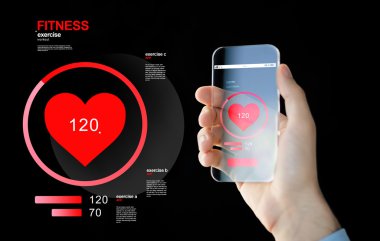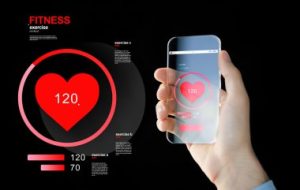
Impact Of Technology On Nutrition And Health (5 Important Technologies)
Impact of technology on nutrition and health is undeniable, ushering in an era of personalized health monitoring, innovative dietary apps, and advancements in food production that have the potential to revolutionize our well-being.
In the symphony of progress, technology has become the maestro orchestrating profound changes in every facet of your lives, and nowhere is its transformative melody more palpable than in the realm of nutrition and health.
As the digital era unfolds, it unfurls an intricate tapestry woven with the threads of innovation, redefining the very essence of how you nourish your bodies and safeguard your well-being. From smart kitchen appliances that calculate the optimal nutritional value of your meals to wearable health trackers that seamlessly integrate into the fabric of your daily routines, the impact of technology on nutrition and health is nothing short of a revolution.
In this dynamic landscape, where algorithms meet alimentation and data converges with dietary choices, the synthesis of science and Silicon Valley is shaping a future where the pursuit of well-being is not just a journey but a meticulously curated experience. The nexus between technology and sustenance is not only reshaping your plates but also redefining the contours of a healthier, more connected tomorrow.

Impact of technology on nutrition and health
In the contemporary landscape, revolution of technology on nutrition and health, altering the way you approach diet, fitness, and overall well-being.
Digital Health Tracking:
Technology has ushered in an era of personalized health monitoring, with fitness trackers, smartwatches, and health apps becoming ubiquitous. These digital tools allow individuals to track their dietary habits, monitor physical activity, and receive real-time insights into their health metrics.

Nutrition Apps and Smart Kitchen Devices:
Nutrition apps and smart kitchen devices have become indispensable companions in modern households. From calorie counting to meal planning, these apps assist users in making informed dietary choices, promoting healthier lifestyles. Smart kitchen gadgets streamline the cooking process, ensuring meals are not only convenient but also nutritionally balanced.

Telehealth and Remote Consultations:
Telehealth has emerged as a transformative force, providing convenient access to healthcare professionals. Remote consultations enable individuals to seek nutritional advice, discuss health concerns, and receive guidance without the need for physical visits. This has proven particularly beneficial in remote areas or during times of restricted mobility.

Precision Nutrition and DNA Testing:
Advancements in technology have paved the way for precision nutrition, where genetic data is leveraged to tailor dietary recommendations. DNA testing services analyze individual genetic makeup, offering insights into how the body metabolizes nutrients. This personalized approach enhances the effectiveness of nutritional strategies, optimizing health outcomes.
Gamification of Health and Wellness:
The gamification of health and wellness has made adopting a healthy lifestyle more engaging. Fitness apps incorporate game-like elements, encouraging users to achieve daily exercise goals, compete with friends, and earn rewards. This innovative approach leverages technology to make health-conscious choices enjoyable and sustainable.

Historical Perspective
Evolution of Technology in the Food Industry:
Explore the fascinating journey of technology in the food sector, tracing its roots from rudimentary methods to cutting-edge innovations. Uncover the metamorphosis of food production, emphasizing pivotal breakthroughs like mechanized farming, refrigeration, and precision agriculture.
Transition from Traditional to Modern Dietary Patterns:
Embark on a historical odyssey detailing the profound transition from traditional to contemporary dietary habits. Unravel the cultural nuances and societal factors steering this shift.
Technological Advancements in Healthcare:
Over the years, healthcare has witnessed remarkable technological strides, from the discovery of antibiotics in the early 20th century to the integration of artificial intelligence and precision medicine in the 21st century, revolutionizing diagnostics, treatment, and patient care. These advancements have significantly enhanced medical outcomes, accessibility, and efficiency in the delivery of healthcare services.
Positive Impacts on Nutrition and Health
Positive impacts on nutrition and health are increasingly evident in today’s digital age, primarily driven by advancements in technology. Access to information has undergone a transformative shift, with health and nutrition apps emerging as powerful tools. These apps, often described as “wellness apps” or “diet trackers,” empower individuals to monitor their food intake, set fitness goals, and receive personalized advice.
Online resources and databases, tagged with terms like “nutritional guides” and “healthy living tips,” play a pivotal role in disseminating evidence-based information. This easy accessibility fosters informed decision-making, enabling users to make healthier food choices.
In the realm of food production and processing, agricultural technology has become synonymous with efficiency and sustainability. Simultaneously, “smart packaging” and “innovative preservation methods” describe breakthroughs in food processing. These advancements not only extend shelf life but also ensure that nutritional value is retained, contributing to the broader narrative of “nutrient-rich diets” and “sustainable agriculture.”
Personalized nutrition, a burgeoning field, owes much of its success to genetic testing and personalized dietary plans. Complementing this trend are wearable devices, often referred to as “health trackers” or “fitness wearables,” which monitor health metrics in real-time. These devices provide a continuous stream of data, facilitating the creation of personalized health plans that align with individual needs and goals.
Negative Impacts on Nutrition and Health
Sedentary Lifestyle
In today’s technology-driven era, the pervasive rise in screen time and diminished physical activity is a cause for concern. Increased screen time, often labeled as the ‘screen addiction epidemic,’ has become a prevalent descriptor. Coupled with this, the pervasive lack of physical activity due to technology use has given rise to the term ‘couch potato culture.’ These sedentary behaviors contribute significantly to health issues, creating a sedentary lifestyle synonymous with health risks.
Processed and Fast Food
The influence of technology on food choices has ushered in an era of ‘digital dining,’ where convenience often trumps nutrition. The term ‘tech-driven food culture’ encapsulates the shift towards processed and fast food, highlighting the impact on dietary habits. This shift, sometimes referred to as the ‘fast food frenzy,’ has led to a decline in the nutritional quality of diets. The convenience of technology-driven food choices has thus become synonymous with compromised health.
Digitalization of Healthcare
The digitalization of healthcare, while revolutionary, comes with its share of concerns. ‘Privacy breaches’ and ‘security vulnerabilities’ have become synonymous with the integration of technology in healthcare. There is a growing dependence on technology for medical diagnosis and treatment, creating a ‘tech-dependent healthcare paradigm.’ This dependence, often described as ‘algorithmic healthcare,’ raises questions about the personalized and human touch in medical care.

Social and Cultural Impacts
Social Media and Body Image
In the contemporary digital age, the pervasive influence of technology on perceptions of beauty has become a focal point of societal discussions. The ubiquitous presence of curated images on social media platforms shapes societal ideals, perpetuating a narrow definition of beauty that often centers on unrealistic standards.
The constant exposure to digitally altered images, often described as “Instagram perfection” or “filtered beauty,” contributes to a distorted sense of self for many individuals. This phenomenon underscores the need for a nuanced conversation around authentic representation and self-acceptance in the digital realm.
The profound impact of social media on mental health, particularly in relation to body image, cannot be overstated. The prevalence of digitally manipulated images and the widespread use of filters contribute to a culture where comparison becomes the norm. This has led to a surge in eating disorders, with terms such as “social media-driven anorexia” and “Instagram-induced bulimia” reflecting the alarming intersection between technology, body image, and mental health.
Technological Divide
Addressing the broader societal implications, the technological divide exacerbates existing disparities in access to both technology and healthcare resources. The term “technological privilege” underscores the advantages enjoyed by those with seamless access to digital tools, often resulting in better health-related information, telemedicine services, and overall well-being.
Socioeconomic factors play a pivotal role in shaping the adoption of technology in health, creating a complex landscape of disparities. Inequities in income and education levels contribute to a digital divide that extends beyond mere access, impacting how individuals engage with health-related technologies. The juxtaposition of “wealth-based health tech disparities” highlights the intersectionality of wealth and health outcomes, emphasizing the need for targeted interventions to bridge these divides.
Future Trends and Innovations
In the ever-evolving landscape of healthcare, artificial intelligence (AI) is revolutionizing the industry with groundbreaking innovations. Predictive analytics for disease prevention is at the forefront, employing advanced algorithms to analyze vast datasets and identify patterns that can predict health risks.
AI’s role in healthcare extends to AI-assisted diagnosis and treatment planning, where machine learning algorithms analyze medical images and patient data to enhance accuracy and speed in identifying ailments. Simultaneously, the field of nutrigenomics is experiencing remarkable advancements, ushering in a new era of personalized nutrition.
Tailored nutritional recommendations based on an individual’s genetic makeup are becoming a reality, offering a targeted approach to health and well-being. The integration of genetic data into healthcare practices is gaining momentum, allowing for a more comprehensive understanding of an individual’s predispositions and enabling healthcare professionals to create customized treatment plans.
Embracing these future trends, healthcare practitioners are increasingly incorporating AI and nutrigenomics into their strategies to provide more precise and effective care. As these technologies continue to evolve, the healthcare industry is poised for a paradigm shift towards personalized and preventative approaches, unlocking new possibilities for improving patient outcomes.

Challenges and Ethical Considerations well-being
Addressing privacy concerns is paramount in the realm of health-related technologies, where data security emerges as a critical challenge. As individuals entrust their sensitive health information to digital platforms, safeguarding against unauthorized access and data breaches becomes imperative. Robust encryption protocols and stringent cybersecurity measures are essential in fortifying the confidentiality of personal health records.
Users often express anxieties over potential vulnerabilities, emphasizing the need for transparent practices and proactive security measures. In navigating the terrain of ethical considerations, obtaining informed consent and safeguarding user rights stand as pivotal aspects. Users expect transparency and the right to control their data, emphasizing the ethical obligation of technology developers to articulate clearly the purposes and potential risks associated with data usage.
Upholding user rights involves providing accessible avenues for individuals to manage and, if desired, revoke their consent. Moving to challenges of accessibility and equity, bridging the digital divide within healthcare remains a pressing issue. Implementing strategies such as improving internet infrastructure, enhancing digital literacy, and fostering inclusivity in design are key to overcoming barriers that limit access to health technologies.
Furthermore, ensuring technology benefits all segments of the population is an ethical imperative. Developers must proactively consider diverse user needs, including those with varying socio-economic backgrounds, disabilities, or limited digital literacy. Striving for technology that enhances healthcare across diverse demographics reflects a commitment to ethical principles and societal well-being.
Recommendations and Mitigation Strategies
Health Education and Literacy:
In the realm of health education and literacy, fostering digital health literacy stands out as a pivotal recommendation. Elevating public awareness about navigating online health resources, understanding medical information, and discerning credible sources are critical for informed decision-making. Emphasizing the importance of balanced technology use is equally crucial.
By educating the public on maintaining a healthy equilibrium in their digital lives, we empower them to leverage technology for health while avoiding potential pitfalls. This approach aligns with contemporary wellness trends, digital wellness, and the rising awareness of the impact of technology on health.
Policy and Regulation:
In the arena of policy and regulation, a key recommendation is the establishment of comprehensive guidelines for technology use in healthcare. Such guidelines should address data privacy, telehealth standards, and the ethical implementation of emerging technologies. Additionally, monitoring and regulating the food industry’s use of technology is paramount. This involves overseeing aspects like food labeling accuracy, supply chain transparency, and adherence to nutritional standards. Implementing robust policies aligns with the growing discourse on digital health governance, ensuring a responsible and accountable use of technology in both healthcare and the food sector.
FAQ: Impact of Technology on Nutrition and Health
Q1: How does technology influence our dietary habits?
Technology has significantly impacted dietary habits by promoting convenience through food delivery apps, meal planning apps, and smart kitchen gadgets. These innovations can affect the types and quantities of food consumed.
Q2: Can technology positively impact nutritional awareness?
Yes, technology plays a vital role in enhancing nutritional awareness. Apps and websites provide information on food composition, nutritional values, and personalized dietary recommendations, empowering individuals to make informed choices.
Q3: What role do wearables play in promoting health through technology?
Wearables, such as fitness trackers and smartwatches, monitor physical activity, sleep patterns, and even nutritional intake. This data helps users track and improve their overall health, promoting a more holistic approach to well-being.
Q4: How does technology contribute to the prevention and management of chronic diseases?
Technological advancements like telemedicine, health monitoring apps, and wearable devices assist in early detection, monitoring, and management of chronic diseases. This can lead to better health outcomes and reduced healthcare costs.
Q5: Can technology lead to overreliance on processed and unhealthy foods?
While technology provides convenience, there is a risk of overreliance on processed and unhealthy food options, such as fast food delivery apps. It is crucial to balance convenience with mindful food choices to maintain a healthy diet.
Q6: Are there risks associated with the increasing use of food delivery apps?
Yes, there are potential risks, such as overconsumption of high-calorie foods and a decrease in the consumption of fresh, home-cooked meals. Users should be aware of their food choices and strive for a balanced diet.
Q7: How can technology help address nutritional disparities and food insecurity?
Technology can play a role in addressing nutritional disparities by providing information on affordable, nutritious food options, and by connecting communities with resources to combat food insecurity.
Q8: Is there evidence that technology contributes to sedentary behavior and a lack of physical activity?
Yes, there is evidence that excessive screen time and the use of technology can contribute to sedentary behavior. It is essential for individuals to be mindful of their screen time and incorporate physical activity into their daily routines.
Q9: Can technology aid in personalized nutrition and diet plans?
Absolutely. Technology allows for the development of personalized nutrition plans based on individual health metrics, preferences, and dietary restrictions. This tailored approach enhances the effectiveness of dietary interventions.
Q10: What steps can individuals take to maintain a healthy balance between technology and nutrition?
To maintain a healthy balance, individuals should practice mindful eating, prioritize fresh and whole foods, limit processed food intake, engage in regular physical activity, and use technology as a supportive tool rather than a sole determinant of dietary choices.
Conclusion
In conclusion, the impact of technology on nutrition and health is undeniable, having ushered in a paradigm shift in how we approach and manage our well-being. From innovative apps that track dietary habits to advancements in medical technology that enable precise diagnoses and personalized treatment plans, technology has empowered individuals to take control of their health. However, it also presents challenges, such as the potential for sedentary lifestyles and the prevalence of processed foods. Striking a balance between harnessing the benefits of technology and maintaining a mindful, holistic approach to nutrition and health is essential for ensuring a positive and sustainable impact on well-being. As you continue to navigate the evolving landscape of technological advancements, it is imperative to prioritize strategies that foster a healthy relationship between technology and the fundamental aspects of nutrition and health, ultimately enhancing your overall quality of life.